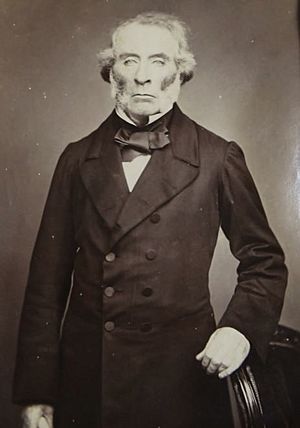James Apjohn facts for kids
Quick facts for kids
James Apjohn
|
|
|---|---|
 |
|
| Born | 1 September 1796 Sunville, Limerick Ireland
|
| Died | 2 June 1886 (aged 89) Southill, Blackrock Ireland
|
| Nationality | Irish |
| Alma mater | Trinity College, Dublin |
| Known for | Discovery of the mineral Apjohnite |
| Scientific career | |
| Institutions | RCSI, Trinity College, Dublin |
James Apjohn (born September 1, 1796 – died June 2, 1886) was an important Irish chemist and physicist. He was famous for discovering a new mineral, which was later named 'Apjohnite' in his honor. He also did important work on how much moisture is in the air.
Contents
A Life in Science
James Apjohn was a well-known scientist who worked in Dublin, Ireland, during the 1800s. He was respected around the world for his studies on moisture in the air, especially something called the Apjohn dewpoint. He also analyzed a special mineral from South Africa. This mineral was a type of manganese alum, and because of his excellent work, it was named 'Apjohnite' after him.
Early Life and Education
James Apjohn was born on September 1, 1796, in Sunville, Limerick, Ireland. He went to Tipperary Grammar School for four years. In 1813, he started studying at Trinity College, Dublin. He earned his first degree in 1817 and then a medical degree in 1821.
A Popular Lecturer
Apjohn began his teaching career in 1824 at the Royal Cork Institution. He became the Professor of Chemistry there. Later, he moved to the Royal College of Surgeons of Ireland (RCSI) as a chemistry professor.
He was a very popular teacher throughout his career. Students loved his clear way of explaining things and his well-planned experiments. Sometimes, so many people wanted to attend his lectures that they had to find bigger rooms!
Royal Irish Academy and Honors
Apjohn was closely involved with the Royal Irish Academy (RIA). He often shared his research papers on chemistry, electricity, and minerals with them.
The year 1837 was very important for him. He earned his M.D. degree from Trinity College. He also received the Cunningham Medal from the Royal Irish Academy. This medal is the highest award the Academy gives. He got it for his paper on how to study the specific heat of gases. The Cunningham Medal celebrates outstanding contributions to science and scholarship.
Professor at Trinity College
In 1841, Apjohn became a lecturer at Trinity College, teaching applied chemistry. About ten years later, he became the Chair of Chemistry at the college. On June 2, 1853, he was chosen as a Fellow of the Royal Society, which is a very high honor for scientists.
By 1855, his role expanded to include the Professorship of Mineralogy. In 1864, he published a book called "Manuel of Metalloids," which was well-received by other scientists. He continued to work at Trinity College until he retired at the age of 78.
James Apjohn passed away on June 3, 1886, in Blackrock, County Dublin. He was 91 years old.
 | Jackie Robinson |
 | Jack Johnson |
 | Althea Gibson |
 | Arthur Ashe |
 | Muhammad Ali |

